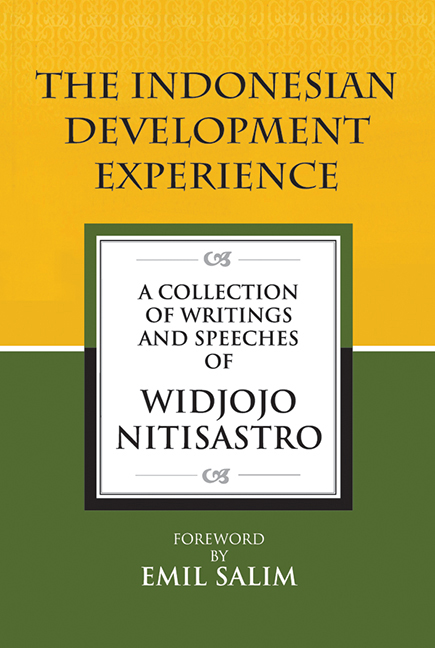Book contents
- Frontmatter
- Dedication
- Frontispiece
- Contents
- Foreword
- Introduction
- Part I PLANNING OF INDONESIA'S DEVELOPMENT
- Part II IMPLEMENTATION OF INDONESIA'S DEVELOPMENT
- Part III FACING VARIOUS ECONOMIC CRISES
- Part IV SETTLEMENT OF FOREIGN DEBT
- Part V EQUITABLE DEVELOPMENT
- 22 Equitable Distribution Programme (1979)
- 23 Fostering Small Scale Enterprises (1977)
- 24 Food, Family Nutrition and Intersectoral Cooperation (1978)
- 25 Reduction of Poverty: The Indonesian Experience (1994)
- Part VI INDONESIA AND THE WORLD
- Index
- About the Author
25 - Reduction of Poverty: The Indonesian Experience (1994)
from Part V - EQUITABLE DEVELOPMENT
Published online by Cambridge University Press: 21 October 2015
- Frontmatter
- Dedication
- Frontispiece
- Contents
- Foreword
- Introduction
- Part I PLANNING OF INDONESIA'S DEVELOPMENT
- Part II IMPLEMENTATION OF INDONESIA'S DEVELOPMENT
- Part III FACING VARIOUS ECONOMIC CRISES
- Part IV SETTLEMENT OF FOREIGN DEBT
- Part V EQUITABLE DEVELOPMENT
- 22 Equitable Distribution Programme (1979)
- 23 Fostering Small Scale Enterprises (1977)
- 24 Food, Family Nutrition and Intersectoral Cooperation (1978)
- 25 Reduction of Poverty: The Indonesian Experience (1994)
- Part VI INDONESIA AND THE WORLD
- Index
- About the Author
Summary
Introductory Note: On the occasion of the 50th anniversary of the World Bank and the International Monetary Fund (IMF), the two multilateral institutions invited me to give a presentation on poverty reduction at the IMF-World Bank Conference “Fifty Years After Bretton Woods: The Future of the IMF and the World Bank” in Madrid, Spain, on 29–30 September 1994. The presentation, “Reduction of Poverty: The Indonesian Experience”, was delivered on 29 September 1994 and published in Fifty Years After Bretton Woods, James M. Boughton and K. Sarwar Lateef (eds-), International Monetary Fund and World Bank Group, Washington DC, 1995, pp. 176–182. The presentation centered on: (1) What lessons can be drawn from Indonesia's experience in achieving a rapid reduction of poverty, (2) What can or should the international community do to assist developing countries in achieving poverty reduction.
Let me first say how honoured I feel to be invited to speak on the topic of sustainable poverty reduction in this conference on the occasion of the fiftieth anniversary of the World Bank and the International Monetary Fund. I would like to express my good wishes to the IMF and the World Bank Group on this most important event. The choice of sustainable poverty reduction as a topic for discussion reflects the commitment of the two institutions to support developing countries in their endeavours to reduce poverty and improve living standards.
As to poverty reduction, I am familiar only with the experience of Indonesia. Therefore, my contribution to this conference will be limited to poverty reduction in Indonesia only. Let me start with a few statistics.
The 1994 Annual Report of the World Bank indicated that:
“Among regions, East Asia and Pacific stands out as the one that has made the most impressive gains in poverty reduction, as well as being the fastest growing. … The most impressive gains have been made in Indonesia, where the percentage share of absolute poverty has fallen from 60 to 15 per cent of the total population over the period (1970–90), and China, where it fell from 33 to 10 per cent”.
The analysis of poverty over time is difficult and controversial. Nonetheless, estimates on poverty in Indonesia has reached a fair degree of consensus: poverty has fallen rapidly over the past twenty-five years.
- Type
- Chapter
- Information
- The Indonesian Development ExperienceA Collection of Writings and Speeches, pp. 287 - 294Publisher: ISEAS–Yusof Ishak InstitutePrint publication year: 2011

